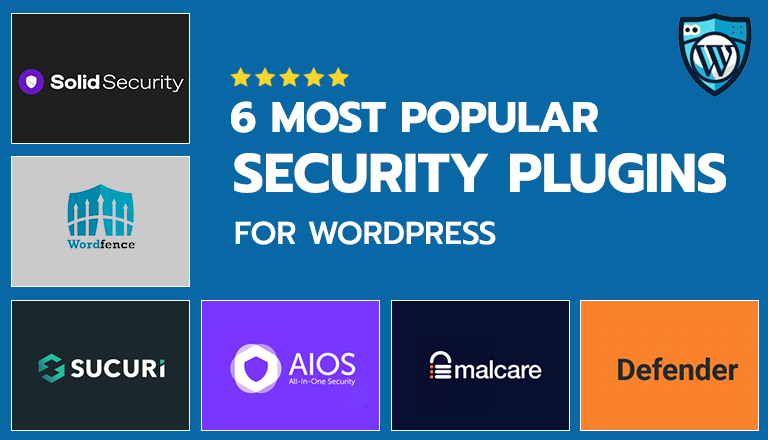Starting a new website is an exciting venture, but it’s crucial not to overlook the importance of security.
As a new website owner, one of the essential steps you can take to protect your online presence is to install a security plugin. These plugins act as the first line of defense against a multitude of cyber threats, including hacking, malware, and unauthorized access.
Websites, especially newer ones, are often targeted by cybercriminals due to low security planning. Without a security plugin, your site is more vulnerable to attacks. These attacks can lead to serious repercussions, such as theft of sensitive data, website downtime, and even damage to your site’s reputation. If customer data is compromised, it can lead to legal issues and a loss of trust, which is especially harmful for a new business trying to establish itself.
Security plugins help mitigate these risks by offering features like malware scanning, firewall protection, and login security.
This article will guide you through the essential features to look for in a security plugin and introduce the top security plugins for WordPress CMS. Each plugin has been evaluated based on user ratings, number of downloads, and a suite of features that make them stand out in the realm of digital security.
Let’s get started.
Essential Features to Look for in a Security Plugin
When it comes to choosing a security plugin for your WordPress site, think of it as assembling your digital security team. Here are the key features to look for:
- Malware Scanning: This is about regularly checking WordPress files for malware, viruses, and weird code. It either compares files with known safe versions or looks for signs of harmful changes. This is super important to catch security issues early and fix them quickly.
- Firewall Protection: A Web Application Firewall (WAF) acts like a security guard for your website. It watches and can block incoming traffic. It stops bad requests, protecting against hacks like SQL injections and cross-site scripting (XSS). A good WAF stays up-to-date with new threats.
- Login Security: This includes steps to make the login process stronger and keep out unauthorized users. This often means limiting login tries to stop brute force attacks and adding two-factor authentication (2FA), which asks for another form of verification besides a password, making user accounts safer.
- IP Blocking/Geo-Blocking: With this, website admins can block access from certain IP addresses or places. It’s handy for keeping out traffic from areas known for cybercrime or blocking specific IPs that are causing trouble.
- Security Notifications/Alerts: Security plugins send you alerts about possible security risks, break-in attempts, and other important security events. These warnings are key for a fast response to security problems, helping to reduce damage and beef up security. You can get these alerts through email, dashboard notifications, or other services.
Top Security Plugins for WordPress
1. Solid Security (formerly iThemes Security)

The Solid Security plugin for WordPress is great for beginners because it’s easy to use and doesn’t need much setting up. It has a simple start-up guide that helps you choose and understand the security settings.
Although it doesn’t have super fancy features like some other plugins, it does have important things like Brute Force Protection, Login Security, and IP blocking. This is really useful for people with small websites. The free version of Solid Security is a good, straightforward option for basic security without making things too complicated.
- Rating: 4.6/5
- Downloads: 900,000+ active installs
- First Release: Oct, 2010
- Pricing: Free and paid plans that start with $99/year for 1 site.
Free (Basic) Plan Features
- Brute Force Protection: Identifies and stops common attack methods on WordPress sites.
- WordPress Login Security: Includes two-factor authentication and password policy enforcement.
- User Ban: Permanently block repeat offenders from site access.
- Network Brute Force Protection: Utilizes a nearly 1 million site-strong community network to block attackers.
- File Change Detection: Logs changes to the website to detect malicious activity.
- Site Scanner: Twice-daily checks for vulnerabilities in WordPress core files, plugins, and themes.
- Security Dashboard: Real-time monitoring of security-related events on your site.
- SSL Enforcement: Forces all connections to the website to be made over SSL/TLS.
- Database Backups: Provides backups of the WordPress database.
Premium Features
- Patchstack Integration: Protects sites against vulnerabilities before patches are available.
- Advanced User Logging: Records detailed user activity including login/logout and changes to site content.
- Automated Vulnerability Patching: Patches vulnerabilities automatically.
- Passwordless Logins: Enhances security while simplifying user login process.
- Trusted Devices: Identifies and secures devices used for accessing the site.
- Privilege Escalation: Securely grants temporary admin-level access.
- Magic Links: Provides login access during lockouts.
- reCAPTCHA: Protects against bots engaging in abusive activities.
- Geolocation: Improves Trusted Devices feature with external location or mapping API.
- Advanced Security Utilities: Includes tools for server IP identification, changing database prefixes, file permission checks, and more.
2. Wordfence

Wordfence is a top choice among WordPress security plugins, used by over 4 million websites. It has a strong Web Application Firewall (WAF) that stops harmful traffic before it affects your site. Plus, Wordfence checks your files, plugins, and themes for malware to keep your site safe.
While it’s packed with lots of features and settings, which is great, new users might find it a bit tricky to use at first.
Download- Rating: 4.7/5
- Downloads: 4+ million active installs
- First Release: Sep, 2011
- Pricing: Free and paid plans that start with $119/year for 1 site.
Free (Basic) Plan Features
- Web Application Firewall: Identifies and blocks malicious traffic, integrated with WordPress for deep security.
- Malware Scanner: Checks core files, themes, and plugins for malware, bad URLs, backdoors, SEO spam, malicious redirects, and code injections.
- Login Security: Includes two-factor authentication via TOTP-based authenticator apps or services and login page CAPTCHA.
- File Integrity Check: Compares core files, themes, and plugins with WordPress.org repository versions for integrity.
- Security Alerts: Notifies about known security vulnerabilities in plugins or themes and potential security issues with abandoned plugins.
- Content Safety Checks: Scans file contents, posts, and comments for dangerous URLs and suspicious content.
- Wordfence Central: Centralized security management for multiple sites, with detailed security findings and configurable alerts.
- Live Traffic View: Monitors real-time visits and hack attempts, including visitor details and activities.
- Basic Blocking Tools: Block attackers by IP, IP range, hostname, user agent, and referrer.
Premium Features
- Real-Time Firewall Rule Updates: Immediate access to the latest firewall rules via the Threat Defense Feed.
- Real-Time IP Blocklist: Blocks all requests from the most malicious IPs to protect your site and reduce load.
- Real-Time Malware Signature Updates: Instant updates for malware signatures via the Threat Defense Feed.
- Country Blocking: Restricts access to your site based on the country of origin.
- Blocklist Monitoring: Checks if your site or IP is blocklisted for malicious activity or spam.
- Advanced Blocking Rules: More sophisticated options for blocking based on specific criteria.
3. Sucuri

Sucuri is usually suggested for big websites because it has advanced features and detailed instructions that might be tough for beginners. Its premium plan is quite pricey, and important things like the website firewall and IP blocking aren’t in the free version.
The best part of the premium plan is that it can help to remove malware, which is really important for cleaning up a site after an attack. But, a common issue with Sucuri is that their support team can be slow to respond, which can be a problem if you need help quickly.
Download- Rating: 4.2/5
- Downloads: 800,000+ active installs
- First Release: Nov, 2011
- Pricing: Free and paid platform plans that start with $199/year for 1 site.
Free (Basic) Plan Features
- Security Activity Auditing: Monitors all security-related events within your WordPress site.
- File Integrity Monitoring: Checks and verifies the integrity of WordPress files.
- Remote Malware Scanning: Utilizes Sucuri’s SiteCheck scanner to remotely scan for malware.
- Blocklist Monitoring: Checks if your site is flagged by major security blocklists.
- Effective Security Hardening: Implements various measures to enhance the security of your WordPress site.
- Post-Hack Security Actions: Provides tools and guidance for responding to a website compromise.
- Security Notifications: Alerts users to various security events and changes.
Premium Features
- Malware and Hack Removals: Unlimited manual cleanups by security experts, with no hidden fees.
- Malware Removal SLA: Estimated ticket response times, with resolution time varying based on complexity and queue volume.
- Post-Cleanup Basic Report: Summary reports detailing cleaned files and recommended next steps for protection.
- Advanced Security Scans: Frequent monitoring for malware, blocklist status, DNS changes, uptime, malicious redirects, and SEO spam.
- Website Application Firewall (WAF): Cloud-based WAF to actively block malicious traffic.
- Blocklist Monitoring and Removal: Notification and assistance in removing your site from blocklists.
- Stop Hacks (Virtual Patching/Hardening): Protection against DDoS attacks and security for outdated software.
- Firewall Protection – HTTPS and PCI Compliant: Encryption of information flow through SSL-enabled firewall.
- Advanced DDoS Mitigation: Global Anycast network capable of mitigating large-scale DDoS attacks.
- CDN Speed Enhancement: A content delivery network to improve page speed and reduce server load.
4. All-In-One (AIO) Security

The All In One (AIO) Security plugin used to be completely free, but now it has moved some key features like malware scanning and two-factor authentication to its paid plan. Even with these changes, the premium version of AIO Security is still more budget-friendly compared to many other well-known security plugins out there.
Download- Rating: 4.2/5
- Downloads: 1+ million active installs
- First Release: Jun, 2013
- Pricing: Free and premium plans that start with $70/year for 2 sites.
Free (Basic) Plan Features
- Login Security Tools: Enhanced protection against brute force attacks and bots.
- Web Application Firewall: Automatic protection from various security threats.
- Content Protection Features: Includes comment spam elimination, iFrame prevention, and copywriting protection.
Premium Features
- Malware Scanning: Regular monitoring and alerts for malware issues.
- Flexible Two-Factor Authentication: Enhanced TFA with role-specific configurations and support for trusted devices.
- Smart 404 Blocking: Blocks IP addresses generating excessive 404 errors.
- Country Blocking: Ability to block traffic based on country origin.
5. Malcare

MalCare’s free version provides simple malware scanning and firewall protection, but it doesn’t have important features like Two-factor login security or IP blocking.
What really sets this plugin apart is how well it deals with hacked websites. It can find and clean up malware-infected files easily with just one click. But, this strong feature is only available in the paid version, so users who want full malware removal tools will need to upgrade.
- Rating: 4.1/5
- Downloads: 400,000+ active installs
- First Release: Jan, 2018
- Pricing: Free and premium plans that start with $149/year for 1 site.
Free (Basic) Plan Features
- Cloud-Based Malware Scanning: Efficient and non-impactful scanning for complex malware.
- Web-Application WordPress Firewall (WAF): Real-time protection against security threats.
- Captcha-Based Login Page Protection: Automatic prevention of brute force attacks.
Premium Features
- Viewing Hacked Files: Detailed insights into infected files.
- Instant Malware Removal: One-click cleaning within 60 seconds.
- WordPress Recommended Website Hardening: Easy-to-configure security best practices.
- Geo-Blocking: Restrict access based on geographical locations.
- Uptime Monitoring: Regular monitoring of website availability.
- Flexible Two-Factor Authentication: Enhanced login security options.
- Automatic Clean-Ups: Unlimited malware removals.
6. Defender

Defender, a newer WordPress security plugin, has several key features in its free version.
The Pro version, which you can get with a WPMU DEV membership, has more tools, like extra scans, reports on vulnerabilities, and audit logs. This membership costs $24 a year and gives you access to more than 10 pro plugins. It’s a great deal for users who want a wide range of WordPress tools and improvements, including everything that the Defender security plugin offers.
Download- Rating: 4.8/5
- Downloads: 90,000+ active installs
- First Release: Jun, 2017
- Pricing: Free and premium plans that start with $24/year for 1 site.
Free (Basic) Plan Features
- Malware Scanner: Scans WordPress core files for modifications and malware.
- WordPress Security Firewall: IP blocking, Geo IP blocking, user agent banning.
- Two-Factor Authentication (2FA): Enhances login security.
- Login Masking: Custom URL for the WordPress admin login.
- Login Lockout: Automatic lockout after failed login attempts.
- User Agent Banning: Block harmful bots and user agents.
- Security Headers: Protection against common attacks like XSS.
- 404 Detection: Automatic bot IP blocking.
- Google reCAPTCHA Integration: Protects against fraud and abuse.
- Pwned Password Check: Security against compromised passwords.
Premium Features
- Scheduled Security Scans and Reports: Automated and thorough malware scanning.
- Safe Repair and Quarantine: Managing malicious files safely.
- Google Blocklist Monitor: Regular checks to avoid Google blacklisting.
- Audit Logging: Detailed tracking of events and activities for security analysis.
Conclusion
To sum up, using a dependable security plugin for your WordPress site is more of a must-have than an optional add-on. Each plugin brings its own set of special features and advantages, addressing different security requirements.
From Solid Security’s easy-to-use automatic checks to Sucuri’s effective solutions for post-attack scenarios, there’s a plugin out there for every WordPress site’s protection needs.
It’s important to choose a plugin that not only deals with the threats of today but also keeps evolving its database to prepare for future challenges.






Share Your Thoughts: